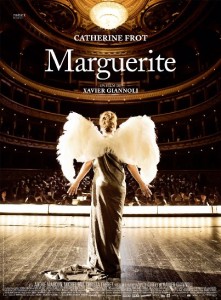Joyce Glasser reviews Maguerite (March 11, 2016)
From time to time movies about the same subject come along in pairs and usually, if the quality is about equal, it’s the earlier bird that catches the box office worm. In the case of Marguerite by Xavier Giannoli, released this week, and Florence Foster Jenkins, Stephen Frears’ biopic of the eponymous tone-deaf singer, released this May, the two are different enough for both to shine.
The central role of the deluded opera singer, whose false notes draw in the snickering crowds, has brought out the heavy guns. Meryl Streep will play Foster Jenkins in the Frears’ film, while Catherine Frot won this year’s Best Actress Cesar Award for her nuanced and touching portrait of Marguerite Dumont, a thinly disguised Foster Jenkins.
Giannoli has transposed the true story from Philadelphia and New York where Foster Jenkins gave recitals between 1912 and 1944, to 1920s France, complete with the latest sport cars, anarchists, fox hunts, bearded lady tarot card readers (Sophia Leboutte) and pretty young boys (Theo Cholbi) keeping aging opera stars happy. While jazz is taking hold of Paris in the Roaring Twenties, in Marguerite Dumont’s (Frot) provincial chateau, Mozart, Bach and Vivaldi are on the programme.
Marguerite is the enigmatic, eccentric socialite who hosts the lavish musical soirées that are the high point of life in the French provinces. She is also a benefactor who spots talented young singers and gives them a chance to show off their talents with a full orchestra.
When the film opens, one such talent, Hazel Klein (Christa Theret) struggles to get past security before being whizzed away by Madelbos (Denis Mpunga), Madame Dumont’s seemingly devoted fixer, chauffeur, piano accompanist and official photographer. Hazel has an exquisite voice and the enthusiastic crowd consider her duet with another singer to be the warm up act to Madame Dumont herself.
While Maguerite waits upstairs in her music room, dedicated to theatrical nostalgia, her husband Georges (Andre Marcon) is pretending that his new, fancy car has broken down yet again. Perhaps Marguerite really knows that Georges is not sincere in his excuses. He confesses to his sympathetic mistress that he dreads the moment when his wife will open her mouth. And when she eventually does, the bemused crowd do not know whether to laugh or cry. One young critic, Lucien Beaumont (Sylvain Dieuaide), enquires of another man: ‘Has she always sung this way?’ to which the man replies: ‘No, she’s come a long way!’
Lucien, who has a conscience, has arrived with his cynical friend Kyril Von Priest (Aubert Fenoy) who does not. While Lucien spots the attractive, talented Hazel, Kyril spots their opportunity. They will exploit Madame Dumont, who seems happy to support their enterprise after reading Lucien’s glowing review – at odds with the more official reviews that are hidden from Madame. The young men entice her to perform at an anarchist cabaret where she brings disgrace upon herself and her husband.
But Madame has tasted the footlights and there is no going back. She begins singing lessons with Atos Pezzini (Michel Fau, who looks a bit like Diaghilev) after rhapsodizing at his performance in Pagliacci. Pezzini is a fading opera star who is blackmailed by Madelbos (Pezzini likes young men) into taking the job. Pezzini brings his decadent entourage to live at the chateau and they milk Madame for as much as they can. Pezzini knows that Magueritte is hopeless, but no one has the heart, or the courage, or the financial interest to tell her the truth…
 Giannoli might be best known to English audiences for his 2006 film When I was a Singer. That film starred Gerard Depardieu as an anachronistic provincial dance-band singer and ladies’ man who is aware that his stardom is dying out along with his fan base. Depardieu was 58 when he imbued the role with a quiet pathos rarely seen in the flamboyant actor. Frot is 59, and Giannoli, who co-wrote the script, ups the level of pathos in order to earn our sympathy.
Giannoli might be best known to English audiences for his 2006 film When I was a Singer. That film starred Gerard Depardieu as an anachronistic provincial dance-band singer and ladies’ man who is aware that his stardom is dying out along with his fan base. Depardieu was 58 when he imbued the role with a quiet pathos rarely seen in the flamboyant actor. Frot is 59, and Giannoli, who co-wrote the script, ups the level of pathos in order to earn our sympathy.
Most Diva’s are jealous of young rivals, but Marguerite offers Hazel such a generous fee that the young woman thinks it is an error. We are heartbroken along with Marguerite when she sees George with his mistress in a red shawl that Marguerite thought was for her. We also learn that it is Marguerite’s personal fortune that finances her folly, and not George’s. We think this is why he is helpless to cut off her funds to end the embarrassment, but George is not the villain of this story.
Frot somehow manages to convey a deluded fool and a sensitive, intelligent music lover (Foster Jenkins was a talented pianist) who is deluding herself in order to live a life that money, if not talent, can buy. Frot’s wonderful performance makes us cringe at her vanity and folly, while our heart aches for her.
If it is difficult to accept the rather contrived ending, the love story that emerges rings true. While Marguerite’s singing prompts George to confess that ‘she is no longer a woman to me; she has become a monster,’ Marguerite sings to gain George’s approval and attention. She brings him her flattering review as a child would present a good school report to a parent. She looks at his empty seat when she performs, and at the start of the film we hear that she will not perform until he has arrived.
While gaining George’s approval cannot be the only reason for her obsession, we realise that, in an odd way, it is what George loves about her. George shoulders the humiliation that she shrugs off and defends his wife when their two-faced music club ridicule her. He suffers far more than Marguerite because he cannot share her delusion.






